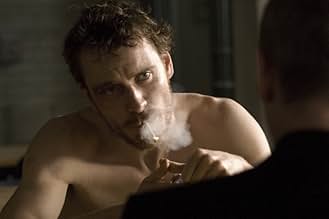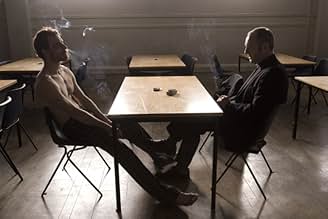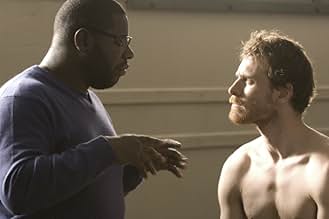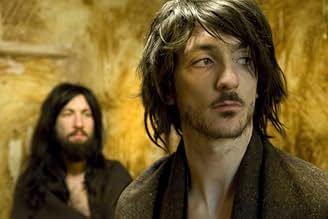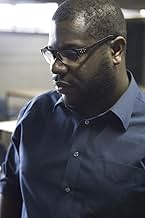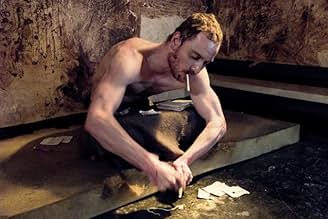Bobby Sands, républicain irlandais, pousse les détenus d'une prison de l'Irlande du Nord à une grève de la faim.Bobby Sands, républicain irlandais, pousse les détenus d'une prison de l'Irlande du Nord à une grève de la faim.Bobby Sands, républicain irlandais, pousse les détenus d'une prison de l'Irlande du Nord à une grève de la faim.
- Réalisation
- Scénario
- Casting principal
- Victoire aux 1 BAFTA Award
- 49 victoires et 39 nominations au total
Avis à la une
1981.
The H block in Belfast's Maze Prison.
This film captures the development and escalation of protest by the 'political' prisoners held here as things moved through 'The 'Blanket protest' onto 'The Dirty Protest" and finally to 'The Hunger Strikes' that claimed Bobby Sands and eight of his compatriot's lives.
As the end credits of the film show, the enemy, in the form of Margaret Thatcher was 'not for turning' and did not grant political status to these men that she considered no more than murderers. They did, however, lead to many concessions - bit by bit.
This astounding movie falls into three very clear sections; the gut wrenching blanket and dirty protest; a long and deeply personal conversation (in one 20 minute take) between Sands and his priest where Sands is asked to justify and then walk away from the impending hunger strike; and finally Sands' ordeal itself.
Each section has a different pace and personality. Each is desperate in its own way.
This film pulls few punches. The stench of human excrement is almost palpable in the opening act and the way in which Michael Fassbender brings Sands' death to the screen is almost unbearable.
But the real triumph of the film is that it takes no political sides and makes no judgements but does not sit on the fence. How? Because it invokes the viewer to do that themselves. Sands is neither a figure to pity or to vilify. It really is quite remarkable that the artist Steve McQueen can achieve this so consistently.
And this is art with a capital A. Every scene is stunningly rendered. The pace, at times snail-like, allows you consider in real detail the situation these men found themselves in (or created however you want to look at it).
Fassbender's performance is miraculous.
McQueen though, is the star of the show. One scene in particular when the men slop out by pouring their night's urine under the doors of the corridor simultaneously is quite beautiful, as is the Hirst-like art that some of them create from their excrement (that's what makes up the poster image).
Film of the year. No contest.
Incidentally we saw it in the DCA's Cinema 2. What a cracking screen.
(As we scoffed coffee and fudge doughnuts. How's that for irony?)
The H block in Belfast's Maze Prison.
This film captures the development and escalation of protest by the 'political' prisoners held here as things moved through 'The 'Blanket protest' onto 'The Dirty Protest" and finally to 'The Hunger Strikes' that claimed Bobby Sands and eight of his compatriot's lives.
As the end credits of the film show, the enemy, in the form of Margaret Thatcher was 'not for turning' and did not grant political status to these men that she considered no more than murderers. They did, however, lead to many concessions - bit by bit.
This astounding movie falls into three very clear sections; the gut wrenching blanket and dirty protest; a long and deeply personal conversation (in one 20 minute take) between Sands and his priest where Sands is asked to justify and then walk away from the impending hunger strike; and finally Sands' ordeal itself.
Each section has a different pace and personality. Each is desperate in its own way.
This film pulls few punches. The stench of human excrement is almost palpable in the opening act and the way in which Michael Fassbender brings Sands' death to the screen is almost unbearable.
But the real triumph of the film is that it takes no political sides and makes no judgements but does not sit on the fence. How? Because it invokes the viewer to do that themselves. Sands is neither a figure to pity or to vilify. It really is quite remarkable that the artist Steve McQueen can achieve this so consistently.
And this is art with a capital A. Every scene is stunningly rendered. The pace, at times snail-like, allows you consider in real detail the situation these men found themselves in (or created however you want to look at it).
Fassbender's performance is miraculous.
McQueen though, is the star of the show. One scene in particular when the men slop out by pouring their night's urine under the doors of the corridor simultaneously is quite beautiful, as is the Hirst-like art that some of them create from their excrement (that's what makes up the poster image).
Film of the year. No contest.
Incidentally we saw it in the DCA's Cinema 2. What a cracking screen.
(As we scoffed coffee and fudge doughnuts. How's that for irony?)
Steve McQueen, a noted young British artist, has made a powerful first film about the Irish prisoners in H-Block of Maze Prison, Northern Ireland, and the hunger strike and death of Bobby Sands in 1981. The images are searing, both horrible and beautiful (McQueen is aware from Goya that images of war can be both), and much of the film is non-verbal, but the action is broken up by a centerpiece tour-de-force debate between Sands (Michael Fassbender) and Father Dominic Moran (Liam Cunningham) that is as intensely verbal as the rest is wordless. In Irish playwright Enda Walsh's rapid-fire dialogue quips are exchanged, then passionate declarations, in a duel that's like a killer tennis match: watching, we listen, and the camera, hitherto ceaselessly in motion, becomes still. Hunger, with its rich language, intense images, and devastating story, is surely one of the best English-language of the year, and it understandably won the Camera d'Or at Cannes for the best first film. Like the American Julian Schnabel, Steve McQueen is another visual artist who has turned out to be an astonishingly good filmmaker.
Faithful to the physical details of the H-blocks and the treatment of the prisoners, the film is still honed down to essentials and includes a series of sequences so intense it may take viewers a long time to digest them. As the film opens, an officer of the prison, Raymond Lohan (Stuart Graham), follows his normal routine. His knuckles are bloody and painful; later we learn why. His wife brings him sausage, rasher, and eggs.
Davey Gillen (Brian Milligan) a young Irish republican prisoner, tall, gaunt, and Christ-like, is brought into the prison. He refuses to wear the prison uniform, so, joining the Blanket protest, he's put in with fellow "non-conforming" prisoner Gerry Campbell (Liam McMahon) in a cell whose walls are smeared with feces. Those of us who were around when these events happened (Steve McQueen was 12, and remembers the coverage), remember them so well we could have seen these walls. Campbell shows Gillen hot to receive "comms" (communications) from visitors and pass them to their leader Bobby Sands at Sunday mass.
When prisoners agree to wear civilian garments, they're mocked by the "clown clothes" they're handed out and riot, screaming and yelling and tearing up everything in their cells. They also periodically collect their urine and pour it under their cell doors out into the prison hallway where the guards must walk. The result is a brutal punishment by the prison in which the prisoners are taken out to the hallway and beaten naked by a gauntlet of police in riot gear. An eventual repercussion is that Raymond Lohan is shot dead while visiting his catatonic mother in a home.
A poetic flourish of the meeting between Sands and Father Moran is Sands's story of going to the country as a Belfast boy on the cross country team and going down to a woods and a stream where he is the only one who dares to put a dying foal out of its misery by drowning it. The images this tale evoke become the objective correlative of Bobby's last thoughts when he is dying in the prison hospital.
The central issue was being treated as political prisoners. From 1972, paramilitary prisoners had held some of the rights of prisoners of war. This ended in March 1976 and the republican prisoners were sent to the new Maze Prison and its "H-blocks" near Belfast. Special Category Status for prisoners convicted of terrorist crimes was abolished by the English government. Hunger doesn't focus on ideology or public policy, other than to have the voice of Margaret Thatcher, in several orotund declarations, adamantly denying the validity of the republicans' cause or status. The Sands-Moran debate is more about feelings and tactics.
Another powerful contrast comes when Sand goes on the hunger strike and is taken to the clean, quiet setting of the hospital where he is lovingly cared for and visited by a good friend and his parents, who're even allowed to sleep there during his last days. Sands' condition is dramatic, heightened by horrible sores, and a report to his parents of the rapid damage to internal organs and heart that his fast will cause.
It was McQueen's decision to eschew a screenwriter in favor of a playwright for the script, and his choice of his near-contemporary Enda Walsh, an Irishman resident in London, was a wise one. McQueen determined the structure and inspired the paring down. Walsh makes the central verbal scene sing. Its intensity is such that it has no trouble at all competing with the harsh prison scenes. It is brilliant stroke. Great theater you could say, but the film's contribution is to make the whole train of events alive and human at a time when they are acutely relevant to the post 9/11 world of Guantanamo and Abu Ghraib.
Shown at Cannes, Telluride, and Toronto, included in the New York Film Festival 2008.
Faithful to the physical details of the H-blocks and the treatment of the prisoners, the film is still honed down to essentials and includes a series of sequences so intense it may take viewers a long time to digest them. As the film opens, an officer of the prison, Raymond Lohan (Stuart Graham), follows his normal routine. His knuckles are bloody and painful; later we learn why. His wife brings him sausage, rasher, and eggs.
Davey Gillen (Brian Milligan) a young Irish republican prisoner, tall, gaunt, and Christ-like, is brought into the prison. He refuses to wear the prison uniform, so, joining the Blanket protest, he's put in with fellow "non-conforming" prisoner Gerry Campbell (Liam McMahon) in a cell whose walls are smeared with feces. Those of us who were around when these events happened (Steve McQueen was 12, and remembers the coverage), remember them so well we could have seen these walls. Campbell shows Gillen hot to receive "comms" (communications) from visitors and pass them to their leader Bobby Sands at Sunday mass.
When prisoners agree to wear civilian garments, they're mocked by the "clown clothes" they're handed out and riot, screaming and yelling and tearing up everything in their cells. They also periodically collect their urine and pour it under their cell doors out into the prison hallway where the guards must walk. The result is a brutal punishment by the prison in which the prisoners are taken out to the hallway and beaten naked by a gauntlet of police in riot gear. An eventual repercussion is that Raymond Lohan is shot dead while visiting his catatonic mother in a home.
A poetic flourish of the meeting between Sands and Father Moran is Sands's story of going to the country as a Belfast boy on the cross country team and going down to a woods and a stream where he is the only one who dares to put a dying foal out of its misery by drowning it. The images this tale evoke become the objective correlative of Bobby's last thoughts when he is dying in the prison hospital.
The central issue was being treated as political prisoners. From 1972, paramilitary prisoners had held some of the rights of prisoners of war. This ended in March 1976 and the republican prisoners were sent to the new Maze Prison and its "H-blocks" near Belfast. Special Category Status for prisoners convicted of terrorist crimes was abolished by the English government. Hunger doesn't focus on ideology or public policy, other than to have the voice of Margaret Thatcher, in several orotund declarations, adamantly denying the validity of the republicans' cause or status. The Sands-Moran debate is more about feelings and tactics.
Another powerful contrast comes when Sand goes on the hunger strike and is taken to the clean, quiet setting of the hospital where he is lovingly cared for and visited by a good friend and his parents, who're even allowed to sleep there during his last days. Sands' condition is dramatic, heightened by horrible sores, and a report to his parents of the rapid damage to internal organs and heart that his fast will cause.
It was McQueen's decision to eschew a screenwriter in favor of a playwright for the script, and his choice of his near-contemporary Enda Walsh, an Irishman resident in London, was a wise one. McQueen determined the structure and inspired the paring down. Walsh makes the central verbal scene sing. Its intensity is such that it has no trouble at all competing with the harsh prison scenes. It is brilliant stroke. Great theater you could say, but the film's contribution is to make the whole train of events alive and human at a time when they are acutely relevant to the post 9/11 world of Guantanamo and Abu Ghraib.
Shown at Cannes, Telluride, and Toronto, included in the New York Film Festival 2008.
It's 1981. Raymond Lohan (Stuart Graham) is a guard in the Maze Prison, Northern Ireland. Davey Gillen is a new IRA prisoner who refuses to wear prison uniforms. He's put in with Gerry who has smeared the cell with his own feces. They smuggle things in and out of the prison. Bobby Sands (Michael Fassbender) leads the prisoners in a hunger strike.
It's quiet film and full of little details. It doesn't wallow in the brutality but lets it envelop the movie. There is a realism in the movie that is more powerful than any flash or action sequence. One really gets the sense of dehumanization. Dialog is sparse but there is a great discussion between Sands and Father Dominic Moran. This is quietly brutal and some great performances including Fassbender.
It's quiet film and full of little details. It doesn't wallow in the brutality but lets it envelop the movie. There is a realism in the movie that is more powerful than any flash or action sequence. One really gets the sense of dehumanization. Dialog is sparse but there is a great discussion between Sands and Father Dominic Moran. This is quietly brutal and some great performances including Fassbender.
Bobby Sands (Michael Fassbender) did something that was a risk, one that would have made others squirm or back out. He was in prison already for four or more years, as a leader in the IRA in Ireland, when he decided to go on a hunger strike. Not just him, mind you, but others along with him, who would all go hungry and, more than possibly, put their bodies on the line for the sake of their brothers in the war, until Britain did something. But the brilliance of Hunger is that director Steve McQueen (not to be confused with the action star) gives us a very straightforward (shockingly so) view of the conditions at the prison, the cell-block where IRA members were put in cells, inhumanely in fact, with feces commonly strewn on the walls and prisoners regularly beaten by SWAT teams and prison guards in general... then, after a very long scene of talk where Sands hears his own plan in front of a priest, the hunger strike in action. It's unrelenting cinema.
It's also sometimes a bit much to take in. You have to know this is not at all melodramatic, but done with little dialog, sometimes in just a few words or whispers (a female narrator pops up once or twice to put things into a sort of context), and compositions that bring out claustrophobia and the endless time spent in the prison. One might wonder why McQueen chooses to keep a shot going for so long on something as trivial, or just routine, as a guard cleaning up the urine left by all the prisoners in the hallways (all in one shot), but it's about that really: the routine of a horrible process of living, of 'us' and 'them' between the prisoners and the guards in this Northern Ireland prison, with Sands as a sort of unofficial leader inside. The length of shots, and the moments where characters burst out in anger and rage, are deliberate and dramatic and powerful.
If I had any problem with Hunger, it's that it is misleading in its first half hour. We're given two prisoners, not Sands, and a prison guard, and we're shown the horrid conditions of living in a solitary-confined prison (feces on the wall, anyone?). But Bobby Sands, the main character, isn't introduced for quite a while. It's an outstanding scene when he is introduced, kicking and pounding and getting beaten down as his hair and beard are cut, yet by then it's been perhaps too long to get to this point. It's also jarring how McQueen structures his film it terms of silent and sound: there's a fifteen minute stretch (almost all in one two-shot) where there's nothing but dialog between Sands and the priest (albeit a riveting conversation about sacrifice and humanity), but aside from this it's all just watching first the IRA members in the horror of prison conditions, and second Sands in his deterioration of the hunger strike.
And yet it is a powerful experience and a stunning debut. It reminds me a little like The Machinist in observing its lead character fade away, literally, before our eyes, only here the stakes are far greater than a tricky neo-noir plot. Fassbender is also mesmerizing for any given moment he's on screen. And yet as great as the film ultimately may be, or is, I don't have a desire to watch it again. It's about as bleak as a rainy day in Dublin - I mean a real rainy day. You won't feel good when the movie ends, but you'll know you have seen the emergence of a filmmaker with something to say, and an actor who will go to the limits, much like Christian Bale, for the sake of the character's importance in the story. Frankly, it rarely gets more dramatic and life-or-death than Bobby Sands.
It's also sometimes a bit much to take in. You have to know this is not at all melodramatic, but done with little dialog, sometimes in just a few words or whispers (a female narrator pops up once or twice to put things into a sort of context), and compositions that bring out claustrophobia and the endless time spent in the prison. One might wonder why McQueen chooses to keep a shot going for so long on something as trivial, or just routine, as a guard cleaning up the urine left by all the prisoners in the hallways (all in one shot), but it's about that really: the routine of a horrible process of living, of 'us' and 'them' between the prisoners and the guards in this Northern Ireland prison, with Sands as a sort of unofficial leader inside. The length of shots, and the moments where characters burst out in anger and rage, are deliberate and dramatic and powerful.
If I had any problem with Hunger, it's that it is misleading in its first half hour. We're given two prisoners, not Sands, and a prison guard, and we're shown the horrid conditions of living in a solitary-confined prison (feces on the wall, anyone?). But Bobby Sands, the main character, isn't introduced for quite a while. It's an outstanding scene when he is introduced, kicking and pounding and getting beaten down as his hair and beard are cut, yet by then it's been perhaps too long to get to this point. It's also jarring how McQueen structures his film it terms of silent and sound: there's a fifteen minute stretch (almost all in one two-shot) where there's nothing but dialog between Sands and the priest (albeit a riveting conversation about sacrifice and humanity), but aside from this it's all just watching first the IRA members in the horror of prison conditions, and second Sands in his deterioration of the hunger strike.
And yet it is a powerful experience and a stunning debut. It reminds me a little like The Machinist in observing its lead character fade away, literally, before our eyes, only here the stakes are far greater than a tricky neo-noir plot. Fassbender is also mesmerizing for any given moment he's on screen. And yet as great as the film ultimately may be, or is, I don't have a desire to watch it again. It's about as bleak as a rainy day in Dublin - I mean a real rainy day. You won't feel good when the movie ends, but you'll know you have seen the emergence of a filmmaker with something to say, and an actor who will go to the limits, much like Christian Bale, for the sake of the character's importance in the story. Frankly, it rarely gets more dramatic and life-or-death than Bobby Sands.
The movie is a timely piece of film-making in this era of Abu Ghraib and Guantanamo Bay. I have to admit my prejudice for the film because of my past as one of the prisoners depicted in the film. Long Kesh or the Maze as the British infamously renamed it was the Abu Ghraib of its day. One stark difference though: unlike Abu Ghraib, no one has ever been charged with the horror and relentless torture inflicted upon naked, defenceless prisoners in Long Kesh. The film is uncompromising in its examination of the events leading up to and beyond the Hunger Strike. Michael Fassbender is frighteningly real. But I will leave it up to the words of Peter Bradshaw in the Guardian to sum it up: 'Hunger is raw, powerful film-making and an urgent reminder of this uniquely ugly, tragic and dysfunctional period in British and Irish history
'
Le saviez-vous
- AnecdotesHunger is known for its unbroken 17 minute 10 second continuous shot, in which Catholic priest Father Dominic Moran tries to talk Bobby Sands out of the Hunger Strike he and his fellow 75 IRA members plan to start. The camera remains in the same position throughout the scene. To prepare, Liam Cunningham moved into Michael Fassbender's apartment, and they rehearsed the scene 12-15 times per day. On the first day of filming, the actors got it perfect after 4 takes.
- GaffesThatcher's speech that says "the men of violence have chosen in recent months to play what may well be their last card" is shown in the film when the hunger strike is beginning, but it was actually made after Bobby Sands had died. It was made on 28th May 1981. Bobby Sands died on 5th May 1981.
- Citations
Bobby Sands: I have my belief, and in all its simplicity that is the most powerful thing.
- ConnexionsFeatured in Front Row: Michael Fassbender/Kate Winslet (2017)
- Bandes originalesIndustry
Performed by Maya Beiser
Composed by Michael Gordon
Published by Red Poppy in association with G. Schirmir, Inc.
Meilleurs choix
Connectez-vous pour évaluer et suivre la liste de favoris afin de recevoir des recommandations personnalisées
Détails
- Date de sortie
- Pays d’origine
- Site officiel
- Langues
- Aussi connu sous le nom de
- Tù Khổ Sai
- Lieux de tournage
- Sociétés de production
- Voir plus de crédits d'entreprise sur IMDbPro
Box-office
- Budget
- 1 500 000 £GB (estimé)
- Montant brut aux États-Unis et au Canada
- 154 084 $US
- Week-end de sortie aux États-Unis et au Canada
- 1 980 $US
- 7 déc. 2008
- Montant brut mondial
- 3 185 113 $US
- Durée
- 1h 36min(96 min)
- Couleur
- Mixage
- Rapport de forme
- 2.35 : 1
Contribuer à cette page
Suggérer une modification ou ajouter du contenu manquant




